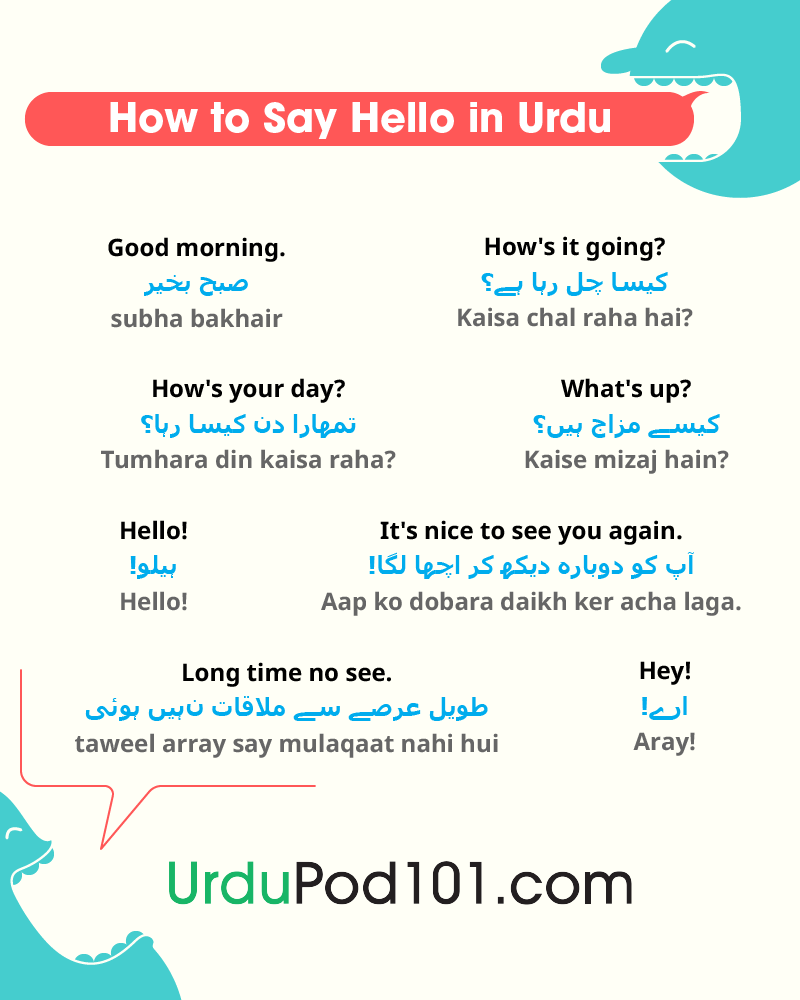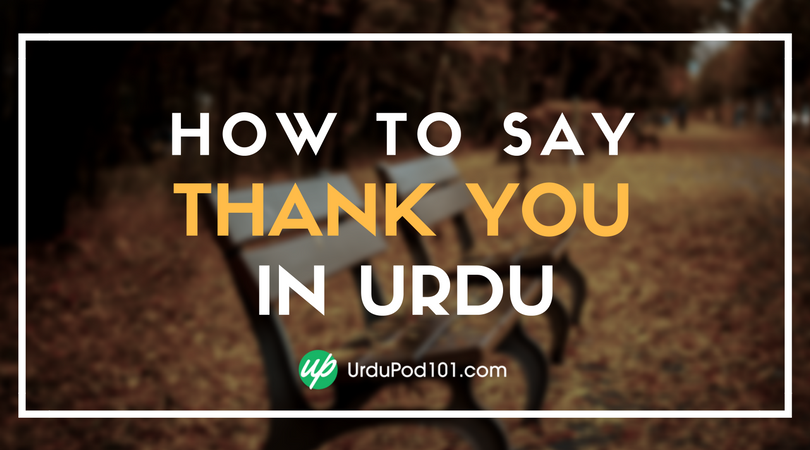The way you meet someone for the first time largely decides the nature of your relationship with them in the future. Without any exaggeration, the very few words or gestures that you use while greeting someone indicate your level of intimacy or professional liaising. Choosing the perfect greeting is the key to perfect bonding in the Urdu language, without a doubt.
So how do you say hello in Pakistan? What’s hello in Urdu?
Saying hello in Urdu is notably significant because it’s your first interaction with the natives. Regardless of your competence in the Urdu language, when you become efficient in opening the conversation in a focused and flawless manner, the locals will become more accepting of you. Consequently, you’ll become even more motivated in future conversations.
In this article, you’ll learn different ways to say hello in Urdu based on the situation, particularly how to say hello in Pakistani Urdu, so that you can always start off on the right foot!
Table of Contents
- Start in a Perfect Fashion
- Contextual Greetings
- Read the Situation and Improvise
- Can We Afford to Use Some Urdu Slang?
- Synchronize Your Body Language and Greetings
- Conclusion
1. Start in a Perfect Fashion
While in Pakistan, you’ll want to greet the natives with their very own Urdu greetings. In terms of greetings in Urdu, there are two things in particular you’ll need to know: how to say hello in Urdu and how to say hi in Urdu.
For this reason, if you want to delve deep into Pakistani society, you must know how to say hi in Urdu, because these most common Urdu words will melt the ice for you and allow you to start building rapport much more quickly.
Keeping this in view, it becomes imperative to know the following:
- What is the meaning of hello in Urdu?
- How do you say hello in Urdu?
- How to say “Hello, how are you?” in Urdu
- How to pronounce hello in Urdu
UrduPod101.com seeks to answer all of your questions on this topic, so that you can say a perfect hello in Urdu writing, or strike up a conversation with locals the right way.
Join us in this exploratory article, and we’ll quench your thirst for learning Urdu!
السلام علیکم (‘Assalam-o-alaikum’)
This phrase is a common way to say hello in Urdu, and literally means “Peace be upon you.” Being an Urdu learner, you can never undervalue such a versatile word or phrase.
السلام علیکم (‘assalam-o-alaikum) is a must-know Urdu greeting which will benefit you in all circumstances. You may use it on all occasions, regardless of their nature (formal or informal) or the gender of the person you’re speaking to. Further, this is a good example of “hello” written in Urdu which can also be used in speech.
If you’re struggling with the pronunciation of السلام علیکم (‘assalam-o-alaikum’) and you want to hear the hello in Urdu pronunciation, you can find it on UrduPod101.com or elsewhere online.
While السلام علیکم (‘assalam-o-alaikum) isn’t the literal translation of “hello” in Urdu, it is the most popular and acceptable. Further, it’s the closest word in meaning to hello for Islamics. Therefore, since Pakistan is an Islamic state, you can use this greeting without worrying about any possible socio-cultural risks.
Some Varied Forms of السلام علیکم (‘assalam-o-alaikum) in Urdu
- سلام
‘Salam’
Hello
سلام (‘salam’) is a variation of السلام علیکم (‘assalam-o-alaikum’) in Urdu. However, morphologically, it’s different; salam literally means “peace,” while Assalam-o-alaikum literally means “Peace be upon you.” Nevertheless, semantically, it means the exact same thing. Therefore, you can use them interchangeably.
- سلام عرض کرتا ہوں۔
‘Salam arz kerta hun.’
I say hello. - سلام عرض کرتی ہوں۔
‘Salam arz karti hun.’
I say hello.
Similarly, the sentences above also introduce us with another way of saying hello to others. The former sentence is used by a male speaker, and the latter by a female speaker.
2. Contextual Greetings
As already stated, the master greeting السلام علکیم (‘assalam-o-alaikum’) can always be used for any occasion. However, there are some contextual greetings you can use if the context is easily identifiable. So what is hello in Urdu for these situations? Below are some examples of greetings in Urdu for specific instances.
A. Specific Greetings with Reference to Time
- صبح بخیر
‘subah bakhair’
Good morning.
When meeting someone in the morning, you can always replace السلام علیکم (‘assalam-o-alaikum’) with صبح بخیر (‘subah bakhair’). It’s a time-specific greeting that’s essentially the alternative of “hello” in Urdu or “good morning” in Urdu.
Some other time-specific greetings are given below:
- شام بخیر
‘shaam bakhair’
Good evening. - شب بخیر
‘shab bakhair’
Goodnight.
B. Online and Phone Greetings
When talking on the phone, you may be pleased to know that the word for hello in Urdu is often a simple “hello” when السلام علکیم (‘assalam-o-alaikum’) isn’t used. Saying hello in Urdu this way is common for phone and internet conversations, due to the fact that many people who use these technologies are well-educated. This is also the case when you want to say hello in Urdu writing while online.
C. Some magic Urdu greeting phrases
When greeting someone in Pakistan with the catch-all word for hello in Pakistani Urdu—السلام علیکم (‘assalam-o-alaikum’)—you’ll get a suitable response in the form of وعلیکم السلام (‘wa alaikum ussalam’), which means “Peace be upon you as well.”
Here are some magic phrases that will strengthen your bond with the native so you can gel with them properly.
- آپ سے مل کر خوشی ہوئی۔
‘Aap say mil kar khushi hui.’
Happy to meet you. - آپ سے مل کر اچھا لگا۔
‘Aap say mil kar acha laga.’
It is nice to meet you.
Listeners will be pleased to hear you say either of these sentences, and they’ll respond back with extra warmth and attention.
3. Read the Situation and Improvise
It’s true that smart people are always at the helm of affairs. In the same vein, if you want to take control of the situation, you must follow the how to say hello lessons at UrduPod101.com which so you can learn the very best how to say hello in Urdu sentences and how to say hello in Urdu phrases. All these lessons and articles introduce you to various situations and teach you how to tackle “hello” in Urdu conversations.
A strong grip of this information will equip you with the knowledge you need to improve and improvise in Pakistani Urdu.
A. A list of a few most common expressions
We’ve discussed that it’s sufficient to say السلام علیکم (‘assalam-o-alaikum’) for all practical purposes; however, there are several formal and informal occasions which may require some deeper and different Urdu greetings. Now let us expand our discussion a little bit more with a list of some formal and informal expressions to greet in Urdu.
B. Formal Hello in Urdu
When you’ve broken the ice with السلام علیکم (‘assalam-o-alaikum’), take the liberty of asking about the well-being of the addressee. Here are two ways of saying “Hello, how are you?” in Urdu:
- جناب،آپ کیسے ہیں؟
‘Janab, aap kaisay hain?’
Sir, how are you? - محترمہ، آپ کیسی ہیں؟
‘Mohtarma, aap kaisi hain?
Miss/Madam, how are you?
Here, you must have noticed that the suitable titles were added to make the conversation more formal.
C. Informal Hello in Urdu
Having learned how to say “how are you?” in Urdu, you’re ready to learn some informal Urdu greetings. Let us learn what to say in an informal Urdu conversation after our master Urdu greeting.
- سلام دوستو، کیسے ہو؟
‘Salam dosto, kaisay ho?
Hey guys, how are you?
Here you can also see the “hey guys” meaning in Urdu. It’s an informal way of interacting with close acquaintances.
- سلام دوست، کیسے ہو؟
‘Salam dost, kaisay ho?’
Hello friend, how are you?
D. The need for identifying the occasion
Identification of the occasion is the most significant factor in the whole process. Here, your own personal acumen will determine what phrases you choose from your how to say hello in Urdu vocabulary. Once you’ve successfully identified the occasion, it will be much easier to know what to say.
Furthermore, below are a few more expressions you can use on different, more intimate occasions:
For male addressee:
- السلام علیکم پیارے
‘Assalam-o-alaikum pyaray’
Hello beautiful.
For female addressee:
- السلام علیکم پیاری
‘Assalam-o-alaikum pyari’
Hello beautiful.
This phrase elaborates the meaning of “hello beautiful” in Urdu.
- السلام علیکم عزیز
‘Assalam-o-alaikum azeez’
Hello dear.
The phrase will help you define the context of “hello dear” in the Urdu language.
- سب کو سلام
‘sab ko salaam’
Hello everyone.
4. Can We Afford to Use Some Urdu Slang?
Slang terms aren’t considered to be part of the formal linguistic vocabulary and are used specifically in informal speech. Following are some Urdu slang words to say hello, for your knowledge:
A few Urdu slang words
- جی جناب
‘ji janab’
Hello - ہاں بھئی
‘haan bhai’
Hello - ارےآپ
‘aray aap’
Hello - ارےتو
‘aray tu’
Hello
5. Synchronize Your Body Language and Greetings
It’s easy to understand that for a beginner, the synchronization of body language and greetings in Urdu can be an uphill task. However, through hard work and exercise, you can ultimately master it. To attain this, be mindful of the following factors and you’ll overcome all the difficult phases on the way.
A. Consult the Pakistani culture
Pakistani society has its own idiosyncrasies; to explore them, you must do your homework. There are many social, cultural, and religious restraints which should always be considered before starting a greeting in Urdu.
B. Mind your body language
Body language assists you a lot in the communication process as a form of non-verbal communication. You can’t afford to use the body language of western societies in Pakistan.
Here are a few tips:
Keep a suitable distance from the others.
You must maintain at least an arm’s length of distance while dealing with the same gender; double this when dealing with the opposite gender.
Use eye contact wisely, especially when interacting with the opposite gender.
Keeping eye contact for longer durations of time with elders may be taken as a token of disrespect. Similarly, while dealing with the opposite gender, it may be taken as a sign of false intentions (i.e. sexual interest).
Smile when and where required.
A light smile has a magical impact. It can be used anywhere, anytime; however, if the occasion is too serious or gloomy, replace a smile with a suitable serious tone and facial expression.
C. Shake hands or not?
Shaking hands is recommended among people of the same gender. Always avoid shaking hands with the opposite gender. Pakistani culture doesn’t allow such intimacy among the opposite gender due to various religious and cultural constraints. This is the case with hugging, too.
D. Haves and have-nots
Dress code. Try to follow the dress-code in Pakistan. Even if you’re wearing western clothes, try to cover as much of your body as possible.
Food. Usually only Halal food is available in open markets in Pakistan, and consumption of liquor is strongly prohibited in open areas for all.
Standing. Standing for others is a way of showing respect in Pakistani culture. In doing this, you stand for others (if you’re already sitting) to welcome someone’s arrival. It’s a gesture of pure respect and honor, and if the person arriving is older than you, it becomes a big must.
6. Conclusion
With us, you’ve developed the know-how of how to say hello in Urdu with a list of currently used Urdu greetings. Your next encounter with native Urdu speakers may come out better now, as you’ll have the advantage of surprising them with your appropriate Urdu greetings.
In case of any questions or queries, consult UrduPod101.com. We provide multiple resources for Urdu learning at your service. Your feedback will help us streamline our resources if ever required. Enjoy UrduPod101.com to brush up your Urdu language skills.
Very Happy Urdu Learning!














